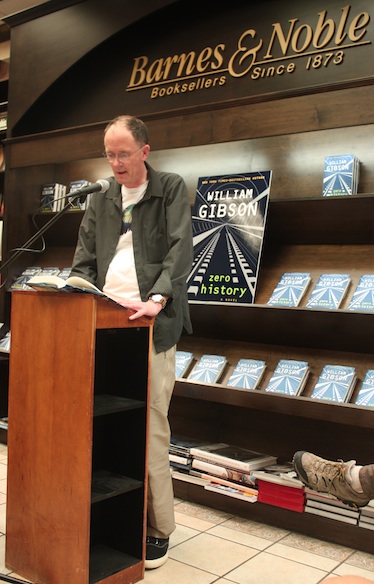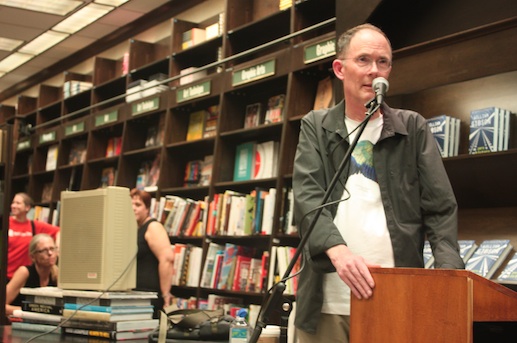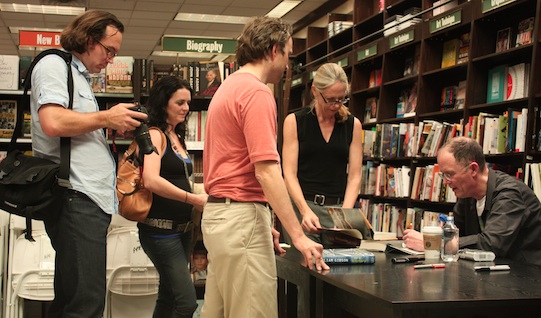October 27th, 2010 — Biz, Digital Ideologies, Fiction
Whoa, I just earned actual money by writing and self-publishing fiction without an agent or a publisher or an editor or an acquisitions editor. Without any other gatekeeper. The point of this post isn’t the handful (or less) of euros, but another anecdote supporting the march toward what might well be a new paradigm for publishing.
I’ve received fan mail for the story; again, this is not to brag, but to point out that netizens actually read and enjoyed the piece without mediators between them and me. (Artistically, critiquers helped me, of course; and, there are Dreamhost and Flattr and other web companies/organizations, plus the overhead cost of running this website. So in a very loose sense there are, if not mediators, connectors.)
The money came because someone I’ve never met flattr‘ed — donated in favor of — my short story “Glenn of Green Gables,” which I self-published under a Creative Commons license.
The license allows readers to share (copy) and remix (adapt; e.g., translate) the story so long as they do so on a noncommercial basis, give my name and my story attribution & linkage, and license any remix/adaptation they make similarly. In other words, share the story all you want, freely, and do something cool with it, unless it involves plagiarism or making money. (If you’re Hollywood, email me.)
Yeah, download the short story, the whole thing, and toss a few coins in the tip jar on my digital street corner here where I’m being your bard.
I think magazines and publishing houses are still very necessary. They provide authors with infrastructure for, say, interviews and book tours, among other functions. (After all, most artist types aren’t the greatest biz folk at promoting themselves.) Houses help readers choose between fiction based on reputation. They connect authors with communities and with editors — though tons of editors are already freelancing outside the umbrellas of publishing houses. AND magazines and publishers still have bigger bullhorns than many websites (including mine), bigger wallets than micro-donaters, and they typically bestow more credibility (for opportunities such as speaking gigs) than self-publications. So, sure, I definitely still want to get a bunch of stories past gatekeepers. They’re not all bad or anything!
But the bottom line: in order to connect with readers and score some pocket change, I won’t have to have gatekeepers’ approval. Not anymore. Score one for the Internet.
Whoa, I just earned actual money by writing and self-publishing fiction without an agent or a publisher or an editor or an acquisitions editor. Without any other gatekeeper. The point...
September 18th, 2010 — Fiction, Texas
William Gibson came to Austin Wednesday, 15 September 2010, and it was very, very cool. The occasion was his new book, Zero History. I talk about my trip down there in my preceding blog post.

The Reading Portion
The Gibson event was, like all Gaul, divided into three parts: a reading (pictured above), a Q&A session (pictured below), and signings (pictured way below). There were maybe 75 people there, some with phones and laptops in constant use during the event, which seemed to me fittingly Gibson-esque.

The Q&A Portion
Notes from the Q&A, things Gibson said. Everything in quotation marks is pretty darn close to what he said; stuff without quotation marks is my paraphrase. Any mistakes are mine, of course.
-
“In the 20th century I seemed to be a futurist writing about the 21st century; in the 21st century I seem to be some sort of naturalist with a science fiction toolkit.”
-
“When you get to the real future, it doesn’t have any capital F; it’s just ‘today.'”
-
He has “trouble with villains.” He said, “As a grown-up, I sort of don’t believe in villainy in the same way I might have done as when I was younger and as our folk culture encourages us to. The bad guys in my books tend to have way too much money and time on their hands, and in my early, sort of further-future fiction, they tended to live way too long, which gave them even more time on their hands […] The real antagonist in all my work is the way the world is — and that’s what undoes the good guys and the bad guys in these books […] and the way people are, or the way I see the world or I see people as being.”
-
I asked Gibson about Wikileaks, and he said he doesn’t have a position on the organization; he said he needs to think about it in more detail. I encouraged him to blog on the subject. :-p (A lot of people are curious as to what he thinks on the issue.)
Gibson did say “when [Wikileaks] announced and hinted about the link [to the Afghan War Collateral Murder video], I thought, ‘ahh, here it comes, I could have done with this not happening for a few more years.'” I take that last not as a commentary on Wikileaks content, but rather — since Gibson has mentioned the inevitability of radical transparency or at least something approximating it — a remark meaning Wikileaks and any similar organizations are going to be such game-changers that we and the world at large will have to seriously and quite stressfully adapt. Here’s my post about Wikileaks.
-
In the course of praising the movie Inception, he said: “If you’ve been doing your job right and doing it long enough, you digest all your influences. So when you’re younger there’s like lumps of gristle in your work and it’s not attractive and you realize you should have airbrushed those lumps a bit before you put [the early work] out.”
-
His debut novel Neuromancer doesn’t make it obvious, but he thought of that one as set in approximately 2035.
-
One great question someone asked was: Overall, do you consider yourself an optimist or a pessimist? Gibson replied, “Actually I think I’m quite optimistic. People said Neuromancer was oh, this grim dystopian vision of large cities with poor people dealing drugs, where could this have come from, this young man’s imagination is too much! [laughter]
“I think today, there’s any number of people in, for instance, Africa, who would migrate to the Sprawl [the above-mentioned fictional setting in Neuromancer] in an instant, and they’d be way better off. The Sprawl looked dystopian if you were really, really better off […] When I wrote Neuromancer, any rational, well-informed individual knew the world could end at any second [due to nuclear holocaust]. [For understanding the] second half of the 20th century, the great historical secret: people my age grew up knowing the world could end at any minute. It wasn’t a conspiracy theory; it almost did [end] a few times, and nobody knew. There was a Russian radar operator / missle man who didn’t launch [missles] when he saw the American bombers coming, and they were coming accidently. Those are the real nodal points [of history]. [The bombers] got called back, and they’d gotten past the point where the guy was supposed to push the button, and the guy was on the phone with the Kremlin saying there was something wrong, ‘I don’t want to shoot.’ I hope this guy got a medal. Everybody should give that man a medal.
“Coming from a world with that stuff going on I thought I was pretty optimistic to write about a world with people in it! In Neuromancer the big corproations decided nuclear war was bad for business anyway.”

The Signing Portion
During the signing portion of the event, I got four books signed, two (Spook Country and Zero History) for me, one (Pattern Recognition) for Wifely, and one (Idoru) for a friend. I was near the back of the at-least-fifty-something-people line, so when I got to the table, I didn’t want to pester him with any additional questions. :) Instead, I blabbled a bit about Wifely and the friend for whom he was signing — I got the books autographed to our Twitter user names, by the way. If I could go back in time, I’d have just said: “I feel like I’m supposed to be saying something, but I’m really happy, so I’m just going to stand here and beam.” Yeah, it was totally worth the drive from DFW to Austin and back (each trip in the same day!). The event definitely made my week.
William Gibson came to Austin Wednesday, 15 September 2010, and it was very, very cool. The occasion was his new book, Zero History. I talk about my trip down there...



 Twitter:
Twitter:
Join the conversation